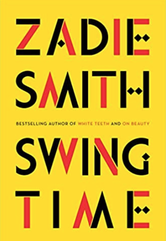A WRITER'S WIT |
My Book World

I often make marginal notes throughout a novel I read, but I allowed this one to wash over me instead, primarily because I couldn’t put it down. Swing Time is, in part, a showbiz novel because the narrator, following college, gains employment as a personal assistant for an American pop star ten years her senior, the single-named Aimee. But first readers must learn of this nameless narrator’s early life in London in which her best friend (at the time) is also biracial (her mother black, her father white, whereas the situation is reversed for her friend, Tracey). She and Tracey meet in dance class, and Tracey’s “pig nose” is highlighted numerous times in the beginning so that one never forgets what Tracey is like, both her looks and her demeanor. She is a slovenly, take-no-prisoners, strong-willed female whom the narrator admires, at least to a point. Though Tracey winds up with the “real” career in show business as a dancer, it is the narrator who, for a decade, at least, derives some status by way of a well-paid and exciting career.
The novel makes a big leap when the setting moves from the UK to Africa, where pop star Aimee decides to build a school for children. The narrator is then dragged into a milieu for which she is unprepared. I admire the way in which Smith seamlessly advances the novel with a back-and-forth movement from era to era, from location to location, chapter by chapter, until readers arrive once again at the present day (2018) of cell phones and social media, phenomena lacking during the girls’ childhoods of the early 1980s. The narrator commits one great sin involving her boss, Aimee, and loses her job. She then returns to London to catch up with her mother, a feminist, who has never been the nurturer her father was. A great read that explores contemporary treatment of race, fame, family, and friendship.
NEXT FRIDAY: My Book World | Phillip Crawford, Junior's Railroaded: The Homophobic Prosecution of Brandon Woodruff for His Parents' Murders



 RSS Feed
RSS Feed